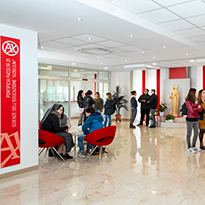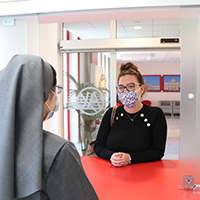Orientation - «AUXILIUM»
PresentationGo top
If you have arrived this far… you have chosen … to choose! That is important, and not everyone does so successfully. You, and you alone, can choose and decide your future: Do not waste this opportunity.
We suggest four steps + two to guide you in your professional future, clarify your choice, and accompany you in becoming a future student and educator.
1. Start with yourselftorna su
The first step is to reflect on yourself:
- What are your ABILITIES and DISPOSITIONS to succeed in a given field that communicate to those who know you that you are “designed for” a particular activity?
- What ACTIVITIES do you enjoy doing? What INTERESTS have you maintained over the last several years? What SUBJECTS most interest you? What would you like to do in the future?
- What DREAMS do you nurture? What GOALS do you want to achieve? Who do you want to become, or what would you like to accomplish in your life?
- What VALUES are important to you? What is of value in your life? Do you have GOALS you are willing to make any sacrifice to attain?
Ideally, these four elements should coincide. If your interests and aptitudes do not coincide your choice may be problematic, although strong interest can sustain those with a minimum of aptitude.
2. Which professional outcomes?torna su
Ask yourself how you might accomplish what you want to study and do. Work activities differ because they:
- require different abilities;
- allow you to fulfill different values and interests;
- require a certain number of years of training;
- have different work schedules and incomes.
- with things: for example, in practical technical jobs, such as an engineer;
- with ideas: for example, as a journalist or literary critic;
- with data: for example, in information technology;
- with people: for example, as an educator, teacher, or psychologist.
3. Orient yourself towards…torna su
If you feel drawn towards university study, be aware that in Italy it is structured in three phases:
* Bachelor's Degree
The first phase, or level, is three years long, at the end of which one obtains the title of “Doctor”. Once one has attained a bachelor’s degree, one can pursue a two year master's degree.
* Master's Degree
The second is a two year program, at the end of which one obtains the title of “Magisterial Doctor”. Once one has obtained a master’s degree, one can pursue a doctorate.
* PhD
This is the highest level of university education, which prepares qualified researchers who are able to carry out research and teaching in universities or advanced research centres. It requires a minimum of three years and a maximum of five years.
* Continuing education
There are particular courses for specializations and professional studies that one can pursue after attaining a degree or a master’s degree. These are Level I and II postgraduate and master studies, advanced training courses, and refresher and training courses. They vary in length according to the type of course.
4. Look around you torna su
Search for information on university orientation events and on post-graduate training in Italy and abroad. Visit the sites of higher education institutions and departments. We recommend Universitaly, the Ministry of Education, Universities, and Research portal, which was created specifically to accompany students in their studies.
IThe work world is complex, particularly these days; it is in constant and rapid flux, and it is impossible to foresee how it will develop. This is why it is important to prepare yourself by continuously staying up to date on trends, forecasts, and future-oriented innovations and skills in high demand. If you want to clarify any of these ideas, fill out the form and request an appointment; we will be happy to talk with you.
CUnderstand the work world in your area. Ask yourself about the professions you like and the courses of study to attain them. The “how” is just as important as the “what”:
- The Orienta Employment Agency (https://it-it.facebook.com/OrientaAgenzia/)
- The CIMEA web site has an overview of the Qualifications Framework, the regulated professions in Italy, and their qualification procedures. (http://www.quadrodeititoli.it/)
Take the time to understand and analyze in depth the skills required for a profession and those that are useful for accomplishing what you want. Developing and improving interpersonal skills are the key factors in meeting the demands of the education professions.
The future that awaits us needs people…
- who are curious, with the desire to constantly learn;
- who can communicate and who are relationship experts;
- who are creative and innovative;
- who are cooperative, collaborative, and able to work in teams;
- who can think critically, debate, dialogue, and work in a multi-cultural setting;
- who are competent in a digital world, able to bring together technology, pedagogy, and ethics;
- who are able to communicate in multiple languages.
5. Not just the University, but the Campus as well torna su
A university is not just lectures and exams. In any academic setting, you can count on a whole range of services that round out your formative experience and contribute to laying out your study track. At the Auxilium Faculty, we offer:
- Italian language courses for foreigners;
- an educational theatre laboratory;
- an ecological spirituality laboratory;
- a critical reading of films laboratory;
- an educational reading laboratory for children;
- a free time educational activities laboratory;
- a laboratory on spirituality and volunteering;
- a sports laboratory.
- orientation colloquia with the faculty;
- psycho-aptitude orientation colloquia;
- Open Day
6. 10 reasons to choose Auxilium torna su
Why choose our Faculty?
- It is a small university
- It is the only university run by women
- It offers a broad education in all three cycles and post-graduate training courses
- It guarantees your right to an education
- It invests in research and innovates in its field
- It offers an international setting
- It lays the foundations for your future work
- It accompanies you in your course of study
- You can live your university life in a city like Rome
- It accentuates its territory and connects students with opportunities for professional internships
Contact us torna su
We are here to help you.
While waiting for the Open Day schedule, you can always ask and receive information regarding the bachelor’s and master’s degrees, enrollment procedures, and the full set of services offered by the Faculty. Fill out the "Open Day Information” form or contact Prof. Anna Peron and make an appointment to learn about the Faculty.
Prof.ssa Anna Peron
mobile. 347 834 20 20
tel. 06 61 57 201
email orientamento.aux@pfse-auxilium.org






